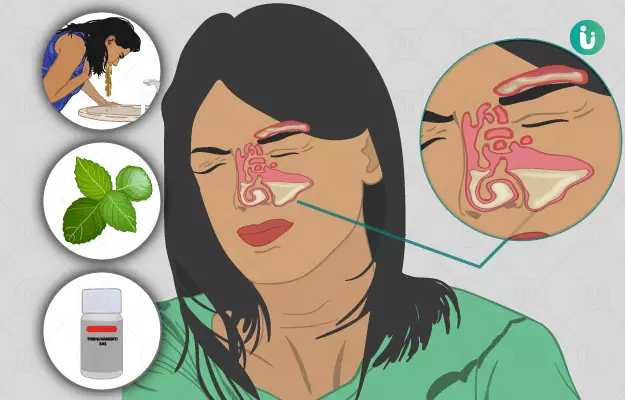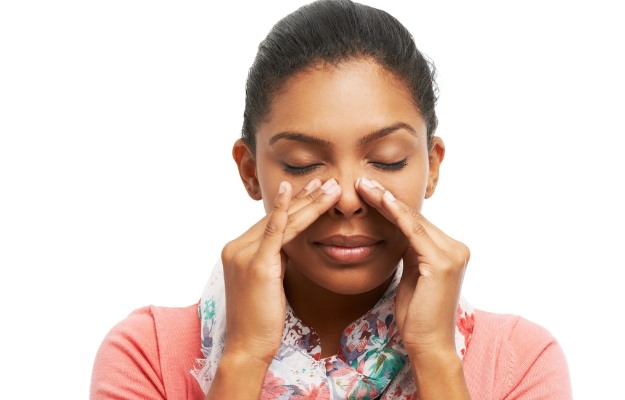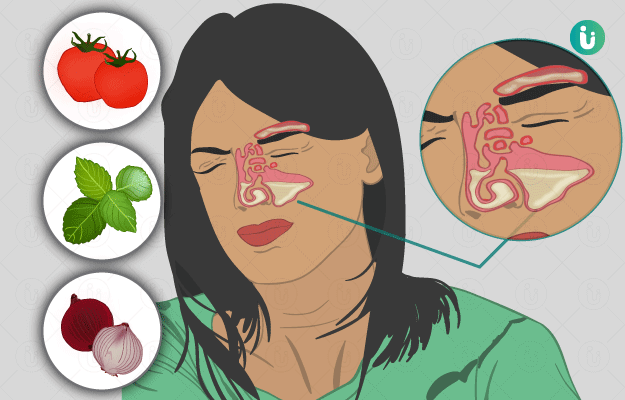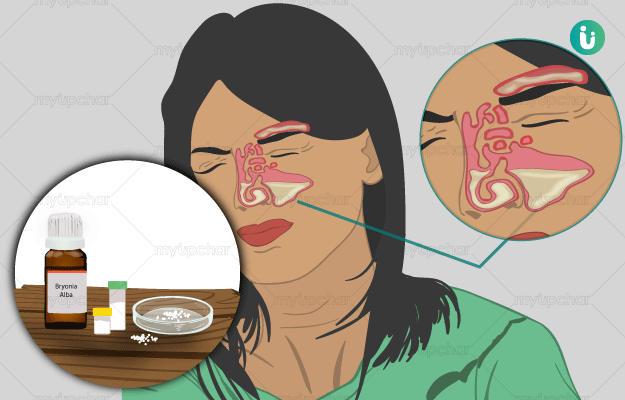Sinusitis, also called dushta pratishyaya, is a common complaint marked by inflammation and swelling of the tissues lining the sinuses. In a healthy individual, sinuses are filled with air, but when a person has an upper respiratory tract infection, there is an inflammatory reaction in the nasal tissues, leading to obstruction of the nasal passage. The individual may experience a severe headache, heaviness, disturbed sleep, and gastrointestinal conditions.
Ayurvedic doctors prescribe ancient and holistic methods for the treatment of sinusitis such as vamana karma (medical emesis), nasya karma (snuffing therapy) and virechana karma (purgation therapy). The following herbs and medicines are generally recommended for sinusitis – bibhitaki (beleric myrobalan), maricha (black pepper), upakunchika (black cumin), adraka (ginger), haridra (turmeric), ghrita (ghee), vacha (calamus), tulsi (holy basil), pippali (long pepper), chitraka haritaki, vyoshadi vati, kaphaketu rasa, laxmivilasa rasa and tribhuvankirti rasa.
- Ayurvedic view of sinusitis
- Ayurvedic treatment for sinusitis
- Ayurvedic herbs and medicines for sinusitis
- Dietary and lifestyle changes for sinusitis as per ayurveda
- How effective are ayurvedic medicines and treatments for sinusitis
- Side effects and risks of ayurvedic medicine and treatments for sinusitis
- Takeaway
Ayurvedic view of sinusitis
As per Ayurveda, the main dosha that is affected in sinusitis is kapha. Increased kapha causes vitiation of prana vata, which is a subtype of vata present in the respiratory tract. It may also be caused due to vitiation of the other two doshas, i.e., vata and pitta. Although exposure to infectious bacteria is known to be the primary cause of sinusitis, from an ayurvedic context, excess buildup of doshas due to improper eating habits and lifestyle is what leads to this condition. Ayurveda uses multiple management techniques to treat this condition. The management methods include detoxification of the body through panchakarma (five treatments) therapy, medications, and dietary and lifestyle modifications.
Ayurvedic treatment for sinusitis
- Vamana karma
- In Vamana karma, vomiting is induced using various herbs and oils. Pre-procedures such as snehana (oleation) and swedana (sudation or sweat therapy) are done before vamana to loosen the excess and vitiated kapha from sinuses and bring it into stomach. Vamana karma then throws this kapha out of the body, thus providing relief from sinusitis symptoms.
- Vamana also removes mucus from the naadis (channels) and chest and throws out ama (toxins) from stomach.
- It is useful in the management of many conditions like kapha fever, nasal discharge, sinusitis and obesity.
- Vamana should be used with caution in pregnant women, children and the elderly. Special precautions should also be taken in individuals with abdominal tumours, high blood pressure, and urinary retention.
- Nasya karma
- Ayurveda states that nose is the gateway to head. Thus, herbs in various forms can be instilled in the nose to treat diseases of the throat, head, neck and senses. Instillation of oil or liquid infused with the properties of herbs into the nasal cavity is called nasya karma.
- It is useful in many conditions such as tonsillitis, migraine, sinusitis, and disorders of the neck, ear, nose and shoulders.
- It can be performed using different types of oils depending on the clinical condition of the individual. Anu taila is one of the oils that can be used for the treatment of sinusitis.
- Virechana karma
- Virechana is one of the main panchakarma techniques. It involves feeding the individual with purgatives like senna and rhubarb that clear excess doshas and detoxify the body. Pre-procedures such as snehana and swedana are done before virechana to loosen the excess and vitiated kapha from sinuses and bring it into the stomach. Virechana karma then throws this kapha out of the body.
- Virechnana karma is an excellent method for treating conditions such as abdominal tumours, haemorrhoids, and colitis.
- It also helps treat sinusitis as it removes the excess phlegm, fat and bile from the body.
- Virechana should not be used in individuals with diarrhoea, rectal ulcers, poor digestion and bleeding disorders of the digestive tract. It should also be avoided in pregnant women, elderly, children, and weak individuals.
Ayurvedic herbs and medicines for sinusitis
Ayurvedic Herbs for Sinusitis
- Bibhitaki
- Bibhitaki acts on the digestive, respiratory, nervous and excretory systems and has anthelmintic (antiparasitic), expectorant, laxative (improves bowel movements), antiseptic and rejuvenating properties.
- It is useful in the treatment of cough, cold, bronchitis, laryngitis, sinusitis, headache and eye disorders. Bibhitaki can be mixed with honey to treat a sore throat.
- It should be used with caution in individuals with increased vata.
- Maricha
- Maricha acts on the digestive, circulatory and respiratory systems and has stimulant, expectorant (expels phlegm), carminative (reduces bloating), antipyretic (reduces fever) and anthelmintic properties.
- It is useful in the treatment of sinus congestion and efficiently treats sinusitis. It is also helpful in asthma, chronic indigestion, fever, gastric problems and sore throat.
- Maricha should be used with caution in individuals with digestive inflammation and increased pitta dosha.
- Upakunchika
- It has a wide spectrum of medicinal properties such as anti-inflammatory, pain-relieving, antimicrobial, anthelminthic, and bronchodilator.
- It acts by reducing vata and kapha and elevating pitta levels in the body.
- It can be used in the treatment of cold as dhoopana. It is scientifically proven to be effective in the treatment of chronic rhinosinusitis.
- Adraka
- Adraka acts on the digestive and respiratory systems and has pain-relieving, carminative, digestive, sialagogue (increasing the flow of saliva) and expectorant properties.
- It is a wonder drug with numerous healing properties that have proved to be beneficial in many conditions. It is used with honey to treat a kapha-dominant disease like sinusitis.
- Extra care should be taken while administering ginger in a pitta-dominant condition as ginger causes aggravation of pitta dosha.
- Haridra
- Haridra is a germicidal, antibacterial, antiseptic, detoxifying agent, healing agent and antihistaminic (prevents allergies).
- It lowers the level of histamine in many kapha diseases such as sinusitis and helps in the management of the condition.
- It should be used with caution in individuals with vata dosha.
- Ghrita
- It is an aromatic that ignites the digestive fire.
- It treats allergies and acts against irritants of the nasal passage.
- It is used along with other herbs haridra for the management of sinusitis symptoms.
- Vacha
- It has a strong aroma and acts as an expectorant and mucolytic (dissolves mucus). Vacha is used as a paste for relieving headaches and joint pain. It is a kapha rejuvenator and helps to manage cold, nasal congestion and polyps.
- It should not be used with bleeding disorders like piles, and excessive use may cause nausea, vomiting, rashes and other pitta conditions.
- Tulsi
- Tulsi is a mucolytic, expectorant, strongly aromatic, blood purifier and antimicrobial. It is useful in the management of respiratory tract problems as it liquefies phlegm, treats allergic bronchitis, asthma and nasal sinus.
- It should be used with caution in individuals with excess pitta levels.
- Pippali
- Pippali has pain-relieving and fever-reducing properties. It relieves cough and cold as it acts as an expectorant and mucolytic.
- It should be used with caution as it causes a rise in pitta level.
Ayurvedic Medicines for Sinusitis
- Chitraka haritaki
- It is a widely used oral therapy for improving digestive system and strengthening respiratory system.
- It consists of vasa (Malabar nut), ela (cardamom), yastimadhu (mulethi) and apamarga (chaff-flower). These ingredients have anti-inflammatory, expectorant and digestive stimulant activities. The combined action of these constituents aids in the treatment of sinusitis.
- It should not be used during pregnancy and breastfeeding.
- Vyoshadi vati
- Vyoshadi vati is a tablet that consists of dried ginger, black pepper, cinnamon, cumin, jaggery and long pepper.
- It acts as an expectorant. All the ingredients of this preparation are known to treat cold and cough.
- It helps in the management of pratishyaya and prevents the occurrence of dushta pratishyaya.
- Kaphaketu rasa
- It consists of shodhita (purified) vatsanabha (Indian aconite), shodhita tankana (borax), pippali, shankha (conch) bhasma (calcined preparation) and adraka swarasa (juice).
- Histamine is a chemical that is released in the body during allergic and inflammatory disorders like sinusitis. Kaphaketu rasa is antihistaminic in nature and helps in the management of inflammatory kapha disorders like bronchial asthma and sinusitis.
- Laxmivilasa rasa
- Different Ayurvedic formulations of laxmivilasa rasa include different ingredients. Some of the common components are abhraka (mica) bhasma, shuddha parad (mercury), shuddha gandhak (brimstone) and lauha (iron) bhasma.
- It destroys and clears the vitiated kapha from body and promotes the production of prakruta (healthy) kapha.
- Thus, it treats numerous diseases including diseases of the head, sinusitis and asthma.
- Tribhuvankirti rasa
- This is a herbo-mineral medicine which contains many herbs and mineral components. Some of the ingredients of tribhuvankirti rasa are herbs like shunthi (dried ginger), maricha, pippali, pippalimoola (long pepper root) and the juice of tulsi, dhattura (devil’s snare), and adrak.
- Various bhasmas like godanti (gypsum) bhasma, shringa (deer horn) bhasma, abhrak (mica) bhasma, etc., are used along with tribhuvankirti rasa. The choice of bhasma to be used in the combination depends upon the dosha dominance.
- It is an excellent therapy for treating fever, inducing sweating and relieving pain. It can help in the management of numerous conditions like sinusitis, migraine, influenza, laryngitis, pharyngitis, pneumonia, bronchitis and tonsillitis.
As treatments vary according to multiple factors and an individual’s prakriti (constitution), consult a qualified Ayurvedic doctor for the appropriate medications and treatments for your specific complaints.
Dietary and lifestyle changes for sinusitis as per ayurveda
Do’s
- Include old shali rice in your meals.
- Include pulses like kulattha (horsegram) and green gram in your meals.
- Take more fruits and vegetables like drumstick, paravala (pointed gourd), radish and garlic.
- Include jaggery, curd and black pepper in your daily diet.
- Drink warm water regularly.
Don’ts
- Do not use cold water for drinking and bathing.
- Do not suppress natural urges such as burping, passing urine etc..
- Avoid eating dry food and consuming alcohol. (Read more: How to quit alcohol)
- Avoid sleeping during the daytime and sleeping on the ground.
How effective are ayurvedic medicines and treatments for sinusitis
A clinical study including 30 participants experiencing uncomplicated chronic sinusitis reported the effectiveness of tribhuvankirti rasa, 250 mg twice a day, along with dashamoola kwatha steam inhalation and nasya karma with anu taila. After two weeks of treatment, a significant improvement was observed in symptoms like headache, pain in the jaw, tenderness and nasal discharge. The treatment was continued for 90 days, and it was found that 46 days of treatment was needed for complete treatment. No side effects were seen during the study, and it was concluded that oral tribhuvankirti rasa along with nasya karma and steam inhalation is effective for treating sinusitis in both men and women.
Another study performed to evaluate the efficacy of pradhamana nasya and trayogdashanga kwatha administration to manage chronic sinusitis indicated that trayogdashanga kwatha produced complete relief in 10% of the participants whereas pradhamana nasya with trikatu and triphala churna produced a marked relief in 81.82% of the participants. When both the therapies were combined, substantial relief was reported by 60% of the individuals. This indicated that nasya karma using trikatu and triphala churna is effective in the treatment of chronic sinusitis
Side effects and risks of ayurvedic medicine and treatments for sinusitis
Although all the medicines and herbs used in Ayurveda are of natural origin, there is a right method and dose to use these therapeutic measures for the management of any condition. For example, vamana and virechana karma need extra care and are better avoided in pregnant women, whereas certain medicines like chitraka haritaki should not be used in pregnant women and lactating mothers.
You should consult an Ayurvedic physician before beginning any of the above-listed therapies for the management of sinusitis. A doctor will prescribe the most suitable treatment based on your clinical condition and prakriti.
Takeaway
The excess pollution today has led to a constant attack on the mucous lining of sinuses. This provokes the doshas, leading to sinusitis. Ayurveda describes various herbs like tulsi, vacha, pippali, maricha and medicines like kaphaketu rasa, tribhuvankirti rasa in the management of sinusitis. Ayurvedic doctors also prescribe various therapies like vamana and virechana karma to manage the condition effectively. As sinusitis causes symptoms like headaches and cold that affect the optimum functioning of an individual and hamper the regular activities, using Ayurvedic remedies and following a healthy lifestyle can help manage symptoms, treat disease, and avoid relapses in the long term.
Find Ayurvedic Doctor in cities
Doctors for Ayurvedic medicine, treatment and remedies for Sinusitis

Dr. Ayush Bansal
Ayurveda
2 Years of Experience

Dr. Megha Sugandh
Ayurveda
6 Years of Experience

Dr. Nadeem
Ayurveda
3 Years of Experience

Dr.Ashok Pipaliya
Ayurveda
12 Years of Experience
References
- Institute of Panchakarma & Research. Sinusitis. Hyderaba, India. [Internet]
- Nisha Kumari et al. Management of Dushta Pratishyaya: A Success Story. Journal of Biological and Scientific Opinion. Volume 1(2) 2013.
- Panigrahi HK. Efficacy of ayurvedic medicine in the treatment of uncomplicated chronic sinusitis. Anc Sci Life. 2006 Jul-Dec;26(1-2):6-11. PMID: 22557218
- Mahboubi M. Natural therapeutic approach of Nigella sativa (Black seed) fixed oil in management of Sinusitis. Integr Med Res. 2018 Mar;7(1):27-32. PMID: 29629288
- Chaudhari V et al. Role of Pradhamana Nasya and Trayodashanga Kwatha in the management of Dushta Pratishyaya with special reference to chronic sinusitis. Ayu. 2010 Jul-Sep;31(3):325-31. PMID: 22131734
- Sonia et al. An Observational Clinical Study on the Management of the Suryavarta Vis-a-Vis Frontal Sinusitis . International Journal of Research in Ayurveda and Pharmacy.4(6), Nov-Dec 2013.
- Dr.B B Joshi et al. Anti-Histaminic Activity of Kaphaketu Rasa on Histamin Induced Bronhcospasm in Guinea Pigs. International Journal of New Technology and Research (IJNTR) , Volume-2, Issue-10, October 2016 Pages 73-74
- HK et al. (2016). Clinical efficacy of Kapha Ketu Rasa on Tamaka Swasa. Journal of Ayurveda and Integrated Medical Sciences (JAIMS). 1. 10.21760/jaims.v1i3.4411. 2016
- Laxmivilas Rasa Bharat Rathi et al. Pharmaco-Therapeutic Profile of - An Ayurvedic Herbo-Mineral Formulation . Journal of Indian System of Medicine. Joinsysmed, 2015, vol 3(3), pp 141- 148
- Dr. Sheelpriya R. Walde,Dr. R. Rachana Devendra et al. Microbial Evaluation Of A Marketed Herbo-mineral Formulation Tribhuvan Kirti Ras. World Journal of Pharmaceutical Research, Volume 6, Issue 5, 1219-1236.
















